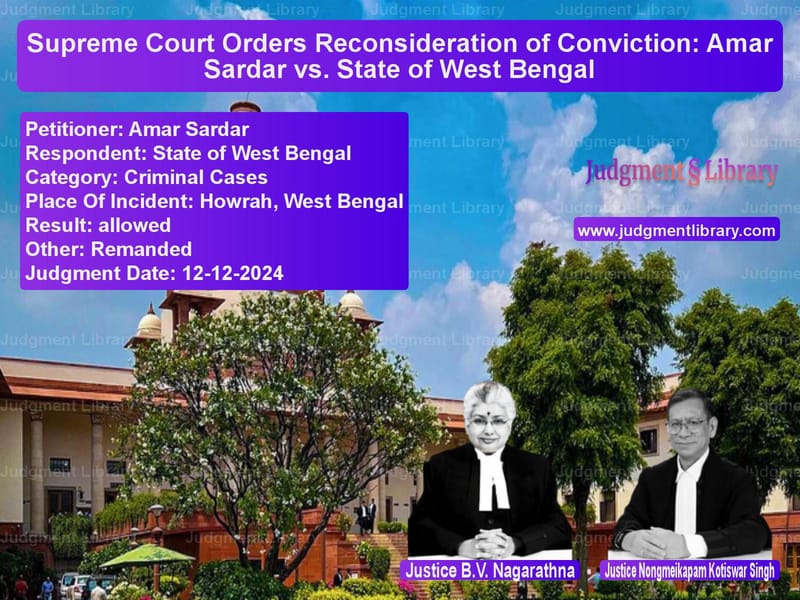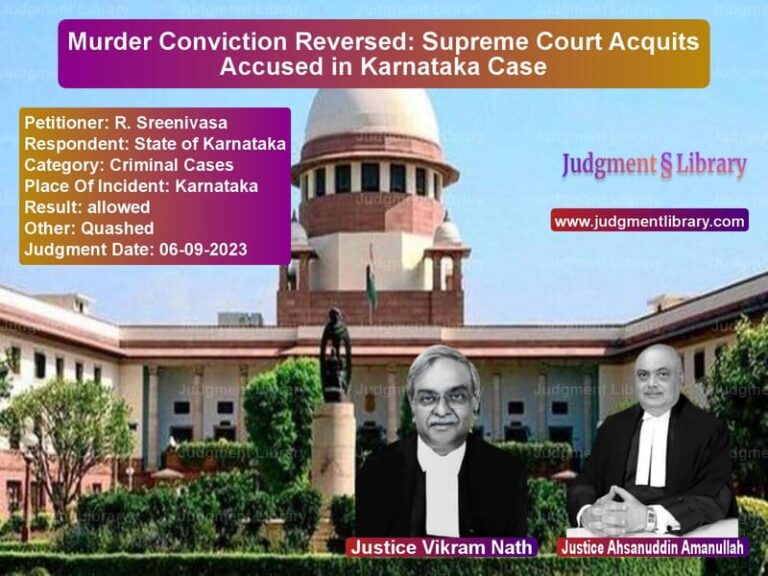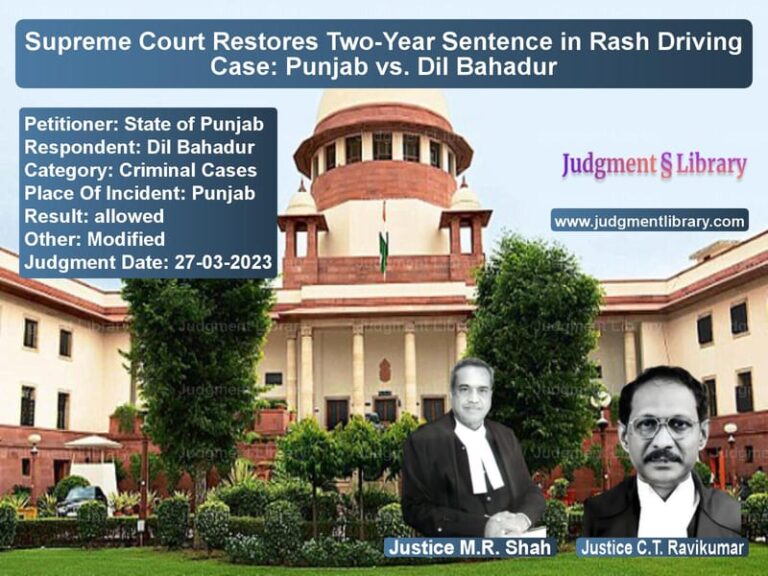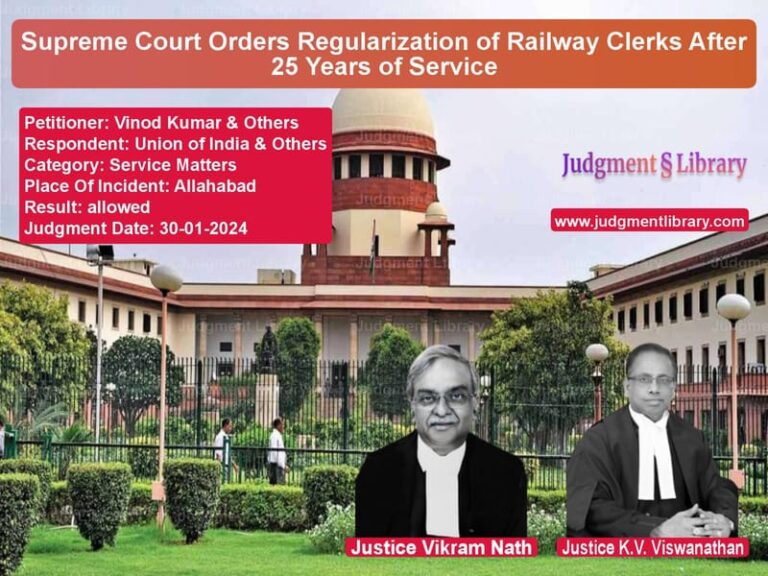Supreme Court Orders Reconsideration of Conviction: Amar Sardar vs. State of West Bengal
The Supreme Court of India recently ruled in the case of Amar Sardar vs. The State of West Bengal, overturning a Calcutta High Court judgment that had upheld the conviction of the appellant. The case revolved around allegations of sexual assault, with charges under Sections 376, 511, and 354 of the Indian Penal Code (IPC). The Supreme Court found that the High Court had not independently assessed the evidence and merely reiterated the findings of the trial court. As a result, the matter has been remanded for fresh consideration.
Background of the Case
The case originated in Howrah, West Bengal, where the appellant, Amar Sardar, was accused of attempted rape and sexual harassment. The trial was conducted before the Fast Track, 3rd Court, Howrah, which convicted him on January 7, 2019. The appellant was sentenced as follows:
- Two years of rigorous imprisonment under Section 354 IPC, along with a fine of Rs. 2,000. In default, he was to undergo one month of simple imprisonment.
- Seven years of rigorous imprisonment under Sections 376 and 511 IPC, with a fine of Rs. 10,000. In default, he was to undergo three months of simple imprisonment.
The sentences were ordered to run concurrently.
High Court’s Ruling
The appellant challenged his conviction before the Calcutta High Court in C.R.A. 111/2019. On May 15, 2024, the High Court dismissed the appeal, affirming the trial court’s findings. The appellant then approached the Supreme Court, alleging that the High Court had failed to conduct an independent review of the evidence.
Arguments by the Appellant
Before the Supreme Court, the appellant’s counsel argued:
- The High Court had simply affirmed the trial court’s judgment without independent reasoning.
- There was no detailed analysis of the prosecution’s evidence or the defense’s arguments.
- Fundamental principles of appellate review were ignored, violating the accused’s right to a fair trial.
The counsel highlighted specific portions of the High Court’s judgment where, instead of evaluating evidence independently, the court merely reiterated the trial court’s observations.
State’s Response
The counsel for the State defended the High Court’s ruling, arguing:
- The High Court had reviewed the trial court’s decision and found no error in its reasoning.
- The appellant’s conviction was based on substantial evidence, and the sentencing was proportionate.
- The appeal lacked merit and should be dismissed.
Supreme Court’s Examination
The Supreme Court critically analyzed the High Court’s approach, emphasizing the necessity of independent reasoning in appellate cases. The bench, comprising Justices B.V. Nagarathna and Nongmeikapam Kotiswar Singh, observed:
“While hearing appeals under Section 374(2) CrPC, the High Court must independently assess the evidence and determine whether the prosecution has established its case beyond reasonable doubt. Merely concurring with the trial court’s findings is insufficient unless supported by an independent justification.”
The Court further elaborated:
- The High Court is obligated to act as a second fact-finding body and re-examine the entire case record.
- Personal liberty is at stake in criminal appeals, making independent judicial scrutiny imperative.
- The judgment should reflect a careful analysis of witness testimonies, medical evidence, and other documentary proof.
Key Legal Precedents Cited
The Supreme Court referred to several past rulings to reinforce its position:
1. State of Uttar Pradesh vs. Ambarish
In this case, the Court held that appellate courts must comprehensively assess all evidence before affirming a conviction.
2. Shakuntala Shukla vs. State of Uttar Pradesh
The Court reiterated that a criminal appeal must involve independent judicial application of mind, not just repetition of the trial court’s findings.
3. State Bank of India vs. Ajay Kumar Sood
The judgment stressed that judicial orders must demonstrate reasoning and not merely restate lower court observations.
Final Judgment
The Supreme Court ruled:
- The High Court’s judgment was set aside due to lack of independent reasoning.
- The case was remanded to the High Court for fresh consideration.
- The High Court must re-evaluate all evidence, consider the defense’s arguments, and issue a well-reasoned judgment.
Implications of the Judgment
This ruling has significant implications for appellate criminal jurisprudence in India:
- Strengthening Appellate Review: High Courts must conduct thorough evaluations in appeals, ensuring justice is not compromised.
- Fair Trial Principles: The judgment reinforces the accused’s right to a fair trial at all judicial levels.
- Legal Precedent: It establishes a benchmark for handling appeals in serious criminal cases, ensuring due process.
Conclusion
The Supreme Court’s ruling in Amar Sardar vs. State of West Bengal highlights the necessity of independent judicial scrutiny in appellate cases. By remanding the matter, the Court has ensured that justice is served through a comprehensive re-evaluation of all evidence. The High Court will now have to rehear the case and deliver a reasoned verdict that fully considers both prosecution and defense arguments.
Petitioner Name: Amar Sardar.Respondent Name: State of West Bengal.Judgment By: Justice B.V. Nagarathna, Justice Nongmeikapam Kotiswar Singh.Place Of Incident: Howrah, West Bengal.Judgment Date: 12-12-2024.
Don’t miss out on the full details! Download the complete judgment in PDF format below and gain valuable insights instantly!
Download Judgment: amar-sardar-vs-state-of-west-bengal-supreme-court-of-india-judgment-dated-12-12-2024.pdf
Directly Download Judgment: Directly download this Judgment
See all petitions in Bail and Anticipatory Bail
See all petitions in Custodial Deaths and Police Misconduct
See all petitions in Attempt to Murder Cases
See all petitions in Judgment by B.V. Nagarathna
See all petitions in Judgment by N. Kotiswar Singh
See all petitions in allowed
See all petitions in Remanded
See all petitions in supreme court of India judgments December 2024
See all petitions in 2024 judgments
See all posts in Criminal Cases Category
See all allowed petitions in Criminal Cases Category
See all Dismissed petitions in Criminal Cases Category
See all partially allowed petitions in Criminal Cases Category







